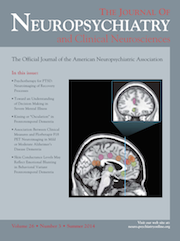Electroconvulsive Therapy in a Patient With a Liver Transplant
To the Editor: Although there are no absolute medical contraindications to ECT, certain high-risk situations are described. Cardiovascular, respiratory, and central nervous system diseases carry increased risks of generalized seizure activity. In this case, we reported the use of ECT in a liver transplant patient with severe psychotic depression.
Case Report
A 58-year-old woman was referred to a university hospital psychiatric clinic for complaints of withdrawal, reduced amount of speech, psychomotor restlessness, irritability, insomnia, unreasonable talk, being suspicious of family members, and attempted suicide. These symptoms started about 8 months prior to the referral, after a liver transplant, and had worsened within 2 weeks. At first, there were depressive symptoms such as reluctance, averseness, and reduced appetite, and then feelings of guilt and worthlessness, and ideas of suicide followed, telling his family “I was damned,” “ The devil is in me,” and “I lost both world and hereafter”; she attempted suicide by jumping out of the car before admission. A few days prior to the referral, she was admitted to other inpatient clinics and had taken escitalopram 10 mg/day, risperidone 1 mg, and lorazepam 1 mg/day. Also, she takes tacrolimus, entecavir, and sülfametoxazole/trimethoprim. After the second treatment, her symptoms markedly decreased, and six sessions ECT were performed.
Discussion
Before ECT treatment, the patient had consults with the general surgery, gastroenterology, neurology, and cardiology departments. Initially, the gastroenterology department did not approve ECT due to the risk of variceal bleeding. After a detailed gastroenterologic evaluation, it was approved. In the literature, there have been few case reports describing ECT treatment for psychotic or severe depression after liver transplant.1,2
1 Chiu NM, Tsai JH, Yong CC: Three index series of electroconvulsive therapy for psychotic depression after orthotopic liver transplantation. Prog Neuropsychopharmacol Biol Psychiatry 2009; 33:1282–1283.Google Scholar
2 : Electroconvulsive therapy for severe major depressive disorder after orthotopic liver transplantation. Psychosomatics 2008; 49:271–272Crossref, Medline, Google Scholar



